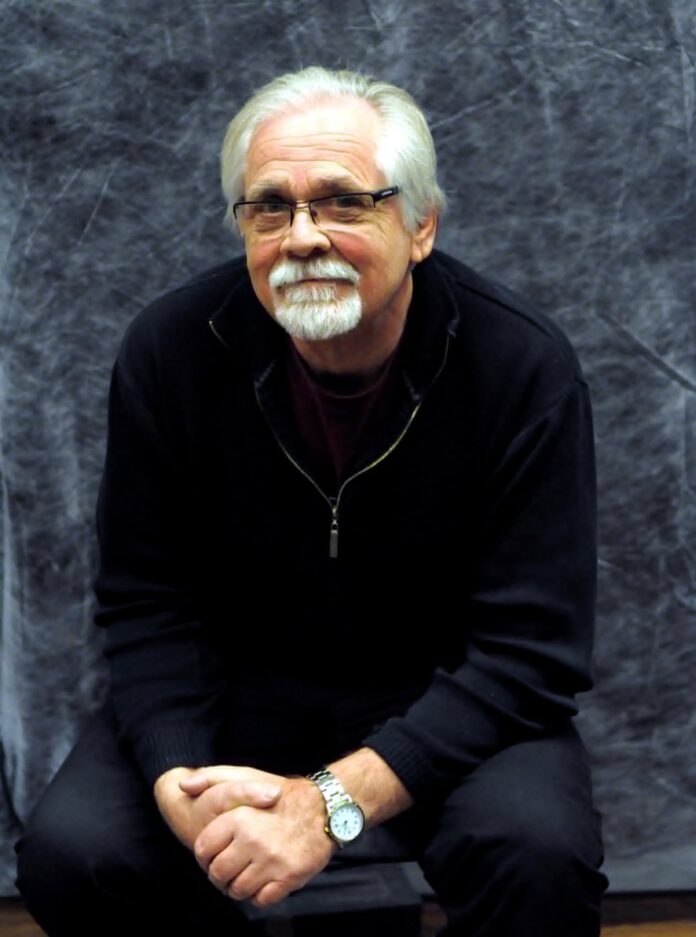BERNT-OLOV ANDERSSON is a Swedish author, playwright and cultural journalist.
He is a former first vice-chairman of the Swedish Writers’ Association, chairman of the Northern writers’ society and Authorcenter North. He is also the initiator of the Stig Sjödin Society and the The Association of Working Writers and a singer in the music groups Band Avd. and Starka Band.
Bernt-Olov Andersson was born in 1947 in Kilafors, Hälsingland, but grew up in Sandviken, Gästrikland, where he has lived most of his life. He debuted as a poet in 1976 and has since written novels, plays and non-fiction. Sandviken and the town’s industrial environment are central to his writing.
Sandviken and the town’s industrial environment are central to his writing, but in his memoir “Den osynliga nåden” (2018), he also talks about his family in Hälsingland. Several of the author’s books have been broadcast as serials on radio. In 2019, he received the Hedenvind plaquette, a major literary prize awarded to working-class writers and 2022 the Ivar Lo Prize, which is one of Sweden’s largest prizes
Author, playwright, journalist and singer. What makes you feel most like yourself?
Basically, I am a poet, even though I have mostly written novels, plays and non-fiction for almost 50 years. Poetry is the first building block of all literature.
What was your approach to the world of literature?
In my youth, I was a bad student at school and had no interest in literature. However, I was very interested in music. I grew up with a father who had a drinking problem. As a young man, I worked, like my father and most of the working-class youth in town, in the large and dominant ironworks. It was a heavy, dirty and monotonous job.
I was 16 when I got my job there and stood at the same machine for six years. I hated it and to save my brain I started writing song lyrics during my work shift.
My father-in-law introduced me to one of Sweden’s greatest poets, Stig Sjödin, who had grown up in the same city. He belonged to an older generation, but had the same background as me. He saw my simple texts as pure poetry and encouraged me to continue.
He gave me a very important advice. He said: “You should read a lot!” I read everything! I started with the Epic of Gilgamesh and the Bible, up to Mayakovsky, Chekhov and Dostoevsky and on to our modern writers. A couple of years later I became a literary critic with a focus on poetry.
Do you remember what was your first poem or story about?
My first poem is no longer there, but I remember it was about how I saw my own future. That I would be chained to a machine my whole life. But I managed to get out of there and trained as a carpenter, which was my profession for seven years.
What was your first book?
My first book was published in 1976 and was a kind of poetic diary, which also contained three short stories. The following year I had a couple of poems published in an English- Swedish poetry magazine, which meant that I, together with a friend, traveled to New York and met many of the underground poets of the time. This resulted in my friend and I publishing the poetry collection “Days in New York”.
The year after this, I published the collection of poems “Between hammer blows and band changes”, which had motifs from my workplaces. On the frontpage of a local newspaper it said “Bernt Olov, you are a sensation”. That was my breakthrough as a poet.
I took courage and quit working as a carpenter. I became something so unusual as a stay-at- home dad with our newborn child for a whole year. I imagined that I would be able to write poetry during that time. It failed already the first week I spent with my son Jonas, who also appears in the poetry collection “Jonassvit”. When my son grew up, he also became a poet. Jonas, our daughter Linnéa and their cousins formed a band that lasted for 10 years and where I was the singer. The band was called “Band Avd”, which was the department in the ironworks where I worked and began my path towards writing. We published a CD that is available on Spotify with the title “Järngrepp”
Why did you start writing prose?
You could say that that headline in the local newspaper silenced me as a poet for almost ten years. I ran various cultural projects, read from my thin collection of poems at libraries and in schools, wrote columns and reviews, started and became chairman of various associations… but no poetry was written.
I realized that I had to move away from my childhood town, in order to devote myself to literature seriously. That’s when short stories, novels, plays and non-fiction books came into my life. No one can survive on poetry alone.
What book do you feel connected to the most?
I have recently published the novel “Alla goda ting”, (All good things) which is the seventh independent book with motifs from the working-class neighborhoods of a small town in Sweden. All these poetry collections and novels are significant to me, because they depict my own childhood environment. And I dare say that I am an expert on my history and the city’s. But the new novel is the last in the series. Now I am going to finish writing another collection of poems.
How would you define your relationship with music?
Poetry is related to music. For me, music is also a precondition for poetry. And it is when poetry and music drill holes in the armor of war that there can be real peace on our earth. Today it is more important than ever.
What are your future plans?
I published a novel last year, but right now I am working on a collection of poems that contains different thoughts and motifs: political, personal and poems I have written on my travels when I have visited different countries. A few days ago I wrote a poem titled “That One”, which tells about my relationship with my father. I grew up in a working-class family, and have worked in heavy industry for 16 years myself, as an ironworker and construction worker, but for fifty years I have been a full-time writer. That means I am now an old man. I will be 78 at the end of this year. I have decided to write poetry for the rest of my life. I made my debut as a poet and want to tie my life together with poetry.
IRMA KURTI is an Albanian poet, writer, lyricist, journalist, and translator and has been writing since she was a child. She is a naturalized Italian and lives in Bergamo, Italy. All her books are dedicated to the memory of her beloved parents, Hasan Kurti and Sherife Mezini, who have supported and encouraged every step of her literary path.
Kurti has won numerous literary prizes and awards in Albania, Italy, Switzerland, USA, Philippines, Lebanon and China. She was awarded the Universum Donna International Prize IX Edition 2013 for Literature and received a lifetime nomination as an Ambassador of Peace by the University of Peace, Italian Switzerland.
In 2020, she became the honorary president of WikiPoesia, the encyclopedia of poetry. In 2023 she was awarded a Career Award from the Universum Academy Switzerland. She also won the prestigious 2023 Naji Naaman’s literary prize for complete work.
Irma Kurti is a member of the jury for several literary competitions in Italy. She is also a translator for the Ithaca Foundation in Spain.
Irma Kurti has published more than 100 works, including books of poetry, fiction and translations. She is one of the most translated and published Albanian poets. Her books have been translated and published in 20 countries.


